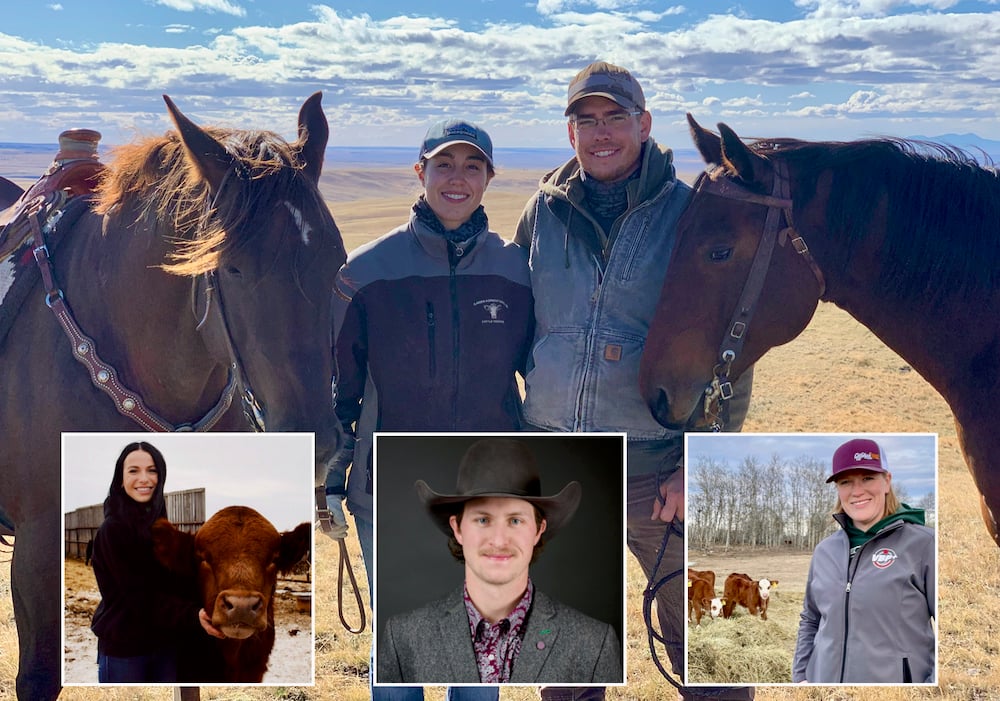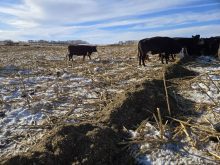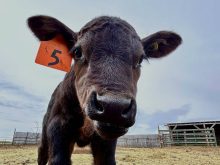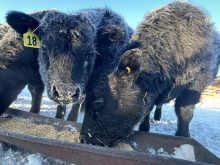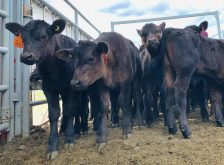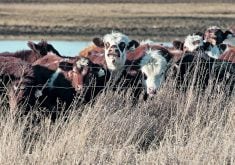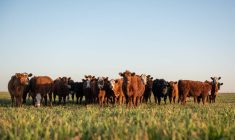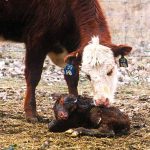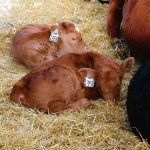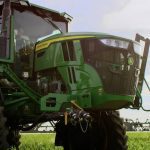Young producers are coming to the Alberta Beef Producers’ table — and they’re bringing their ideas and passions with them.
Kaylee Chizawsky is one of them.
The fourth-generation cattle farmer is one of a number of younger people serving as a delegate or board member for the five-decade-old organization. It’s important that her generation “advocate for our industry,” said the 26-year-old.
Read Also
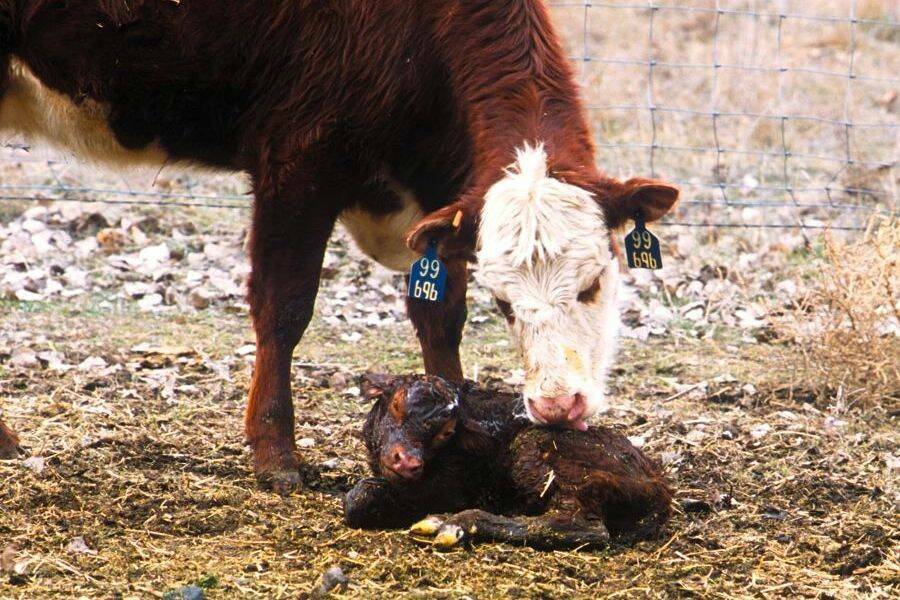
Scours doesn’t hibernate: Infectious risks for cold weather calves
Identifying specific pathogens and management flaws is essential for effective calf scours treatment and prevention on your farm.
“We are going to be the future of beef and will be taking over our family operations,” said Chizawsky, a territory manager for Zoetis who splits her time between Edmonton and her family’s ranch in Vegreville.
“We come with new ideas, and it is our livelihood, so it is our job to protect it and stand behind it. I think it’s important for me to advocate for the industry because I 100 per cent stand behind how we raise our animals.
“At the end of the day, raising beef isn’t just a career for us, it’s a livelihood and we do what we do for the simple fact that we love cattle and love what we do. So I feel like it’s a part of my responsibility to protect it and advocate for it.”
Austin Dow is another new delegate — and one who is also working off farm as he works to become established in the cattle business.
The 27-year-old and his wife Kaitlin farm with Dow’s father near Onoway, but he makes his living as a horse trainer. He studied crop technology at Lakeland College and bought his first cows in 2018, slowly building up his herd by buying 10 to 20 cattle every year. (He’s now up to 75 head.)
“I’ve always wanted to be on an ag board of some sort — I wanted to bring a young producer’s opinion in,” he said. “ABP was the first association that I thought of, and it was looking for someone to fill a delegate seat. I just wanted to get more involved and make some more contacts and meet some more producers. I’ve been interested in that for a long time.”
In a sector where more than half of producers are on the far side of 55, it’s important to bring younger people into the industry. But the obstacles just keep getting larger, said Dow.
“I have friends who are interested in getting into cattle, but if they don’t have land to get established on, it’s just impossible, especially with the costs of everything,” he said. “You can’t live off a quarter of land anymore. Everyone works off farm, and even some guys who have a lot of cattle work off the farm in the wintertime.”
It’s an issue that Melissa Downing thinks about a lot, even though she’s established in the sector and knows it well from her role as the provincial co-ordinator for Verified Beef Production Plus.
“With VBP+, I’ve been closely tied to ABP for several years, and following along with the topics that have been discussed at their annual general meetings, and their zone meetings,” said the 38-year-old University of Alberta grad, who farms near Provost with her husband.
“I really feel that it’s important, that if we want to be successful, that we as young producers are helping set the direction for the industry by being engaged early on.
“I’m hoping we can be in the industry for a number of years, so the things that we talk about now will impact our future and our kids’ and our grandkids’ future.”
Although he’s just 31, Brodie Haugan is an old hand with ABP, having served as a delegate or director for eight years.
“I got involved with the Cattlemen’s Young Leaders mentorship program coming out of university,” said Haugan, who operates a mixed farm with his parents and girlfriend Melissa Lemmer at Orion, where they grow cash crops, run about 400 mother cows, and do some backgrounding and finishing.
“I sort of knew that if I came straight home, I would lose connection with the industry and what was happening — it’s quite easy to just put your head down and go to work. I needed to find a way to have some connection with something else that was happening, other than what was happening right here.”

What he found is that farm organizations are involved in a lot of issues — and most of their members don’t know the half of it.
“There’s a lot more to the conversation or the story than people realize,” said Haugan, who is serving his second year as ABP’s finance chair.
“There’s a lot of hard work put in by a lot of individuals, both staff members of ABP and other membership organizations in our industry — as well as producers who have volunteered countless hours and days of their time to be involved and to be in these conversations.
“What a lot of producers see once programs or initiatives are rolled out, is just sort of the tip of the iceberg of the amount of work and dedication that has gone into them.”
Dow admits he was part of that group.
“I had no idea what they did with the checkoff dollars, and what they did for aid and getting provincial and federal support,” he said. “All that money is behind the scenes, and nobody knows about it, unless they’re involved with it.”
Refunding of checkoff dollars has been a major financial strain for ABP for many years but Dow said he wants to spread the word about how those funds are being used and how they benefit producers.
“People don’t even realize what ABP is doing — I want to help people realize to help keep that (checkoff) money,” he said.
Working today for tomorrow
Chizawsky majored in animal science at the University of Alberta, and has (among other things) worked for the animal health division of the Canadian Food Inspection Agency and was a member of the 2020 cohort of Cattlemen’s Young Leaders (a Canadian Cattlemen’s Association mentorship program that pairs young producers with industry vets).
“After I completed the CYL program, I wanted to continue to be actively involved and continue advocating for and representing the beef industry,” she said. “That was my driving force for wanting to be a delegate for the Alberta Beef Producers.

“I think my age offers a bit of a different perspective on the many topics that ABP discusses. It also gives me the good fortune to sit at the same table with so many experienced, knowledgeable, and driven people in the cattle industry that I get to learn from.”
Being involved in a group also offers opportunities to meet and interact with a wide variety of people, added Downing, who recently joined the board of the Canadian Cattlemen’s Association as ABP’s rep.
“I do see the ways that issues impact us at the farm level — it may be further removed and doesn’t seem as direct, but I do see how it comes down the pipe to us,” she said. “I feel it’s important for us to have good relationships with people across the country, with people in all different roles — political roles or industry roles, so they stay connected to producers on the ground.”
Having served with ABP for eight years, Haugan (another Cattlemen’s Young Leaders alumni) has seen initiatives go from being a concept to being implemented. It’s something that makes you realize that you can make a difference, he said.
“Getting involved with ABP was my way of understanding what was happening in the industry, what was coming, and what we could potentially influence and have some say over, rather than just being told and forced,” he said.
The financial stakes are only getting larger, and even though that puts more pressure on young producers to focus on the farm, their voice needs to be heard, said Haugan, a 2013 grad of USask’s bachelor of science in agribusiness program.
“It’s important to realize that young people do have something to say and to contribute to the industry,” he said. “We’re making decisions that will affect us more than the older generations, because we’re hopefully going to be here for another 20 to 30 years.
“The things we’re working on today will have a direct impact on us.”
That’s also important for Chizawsky, who hopes to one day take over the family farm.
“I’ve always known that the cattle industry is for me. One of my happiest places is out with the cows.”
But young cattle producers need to use their passion and be advocates for a sector that is increasingly under fire, she added.
“Consumers are becoming more conscious on where their food comes from, and over the last few years more and more millennials have questions on how beef is raised, what a beef operation’s environmental impact might be, how sustainable our operations are, and how we prioritize and manage animal welfare,” she said.
“I think there is no better person to help answer those questions and create that transparency than a fellow millennial who is raising cattle.”
Haugan agrees, but said the sector also has to find ways to allow young people to get into the cattle business and succeed at it.
“We have to create an industry that has stability — with an income to build a business around, and get operating loans and things like that, but that also allows for the ability to have a family and a lifestyle and everything that comes with living in a small community and doing this,” he said. “It’s more than a job, it’s a lifestyle. If we don’t have support, it’s really difficult, because there are a lot of other industries pulling our young people away.”
That’s a view echoed by Downing.
“We need to look at the long term, and how we keep people engaged in the industry,” she said. “I find that as the next generation, I’m already looking at my kids, and wondering if there is going to be a viable industry for them.
“The things that we are dealing with now could help set the direction of the future for my kids and grandkids.”
And, she added, don’t think you don’t have a lot to contribute just because you’re younger.
“I’ve always felt that I don’t have enough experience or I don’t have enough to offer in that role, but people do,” said Downing. “Whether you think you do or not, you probably have a lot more to offer than you think you do as a young producer because we need those different perspectives and different experiences.”


